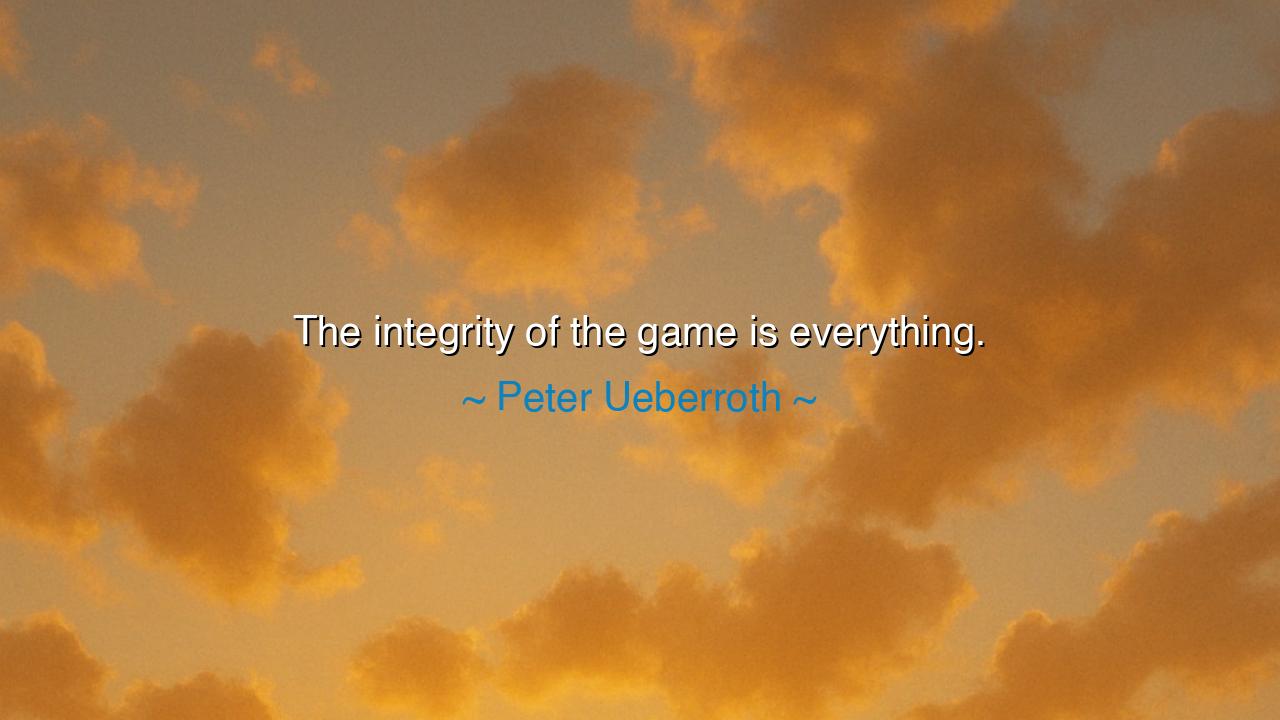
The integrity of the game is everything.






Hearken, O seekers of wisdom and virtue, and attend the words of Peter Ueberroth, who spoke with clarity and moral purpose: “The integrity of the game is everything.” In these words lies a profound truth, timeless and unyielding: that honor, fairness, and ethical conduct form the foundation upon which all sport—and indeed all human endeavor—must rest. Without integrity, skill and triumph are hollow, and victory itself is rendered meaningless.
The origin of this insight rests in Ueberroth’s life as an organizer, administrator, and steward of sport, notably as the Commissioner of Major League Baseball and as the architect of the 1984 Los Angeles Olympics. He understood that the spectacle of sport captivates the human heart only so long as the contests are conducted with honesty, fairness, and respect for rules. Integrity is the unseen framework that gives meaning to every play, every contest, and every accolade.
Consider the story of Lou Gehrig, whose career and legacy exemplified integrity on and off the field. Gehrig’s dedication, fairness, and respect for the game made him beloved not merely for his prowess, but for the honor with which he competed. Ueberroth’s words echo this principle: talent alone cannot sustain admiration; it is integrity in action that transforms performance into lasting reverence and legacy.
The ancients understood this principle well. In the Olympic Games of Greece, victory alone did not suffice; athletes were celebrated for excellence combined with adherence to rules, virtue, and fair play. To cheat, to deceive, or to act in dishonor was to forfeit not only victory, but moral standing. Ueberroth’s assertion resonates across time: the worth of the game—and the dignity of its champions—is inseparable from the integrity with which it is conducted.
Yet the lesson extends beyond sport. Life itself is a contest of challenges, ambitions, and relationships. Success gained through deception or violation of ethical principles is fragile, and its rewards are fleeting. The cultivation of honor, fairness, and truthfulness ensures that achievements endure and that trust is preserved among peers, community, and posterity. Ueberroth reminds us that ethical foundations are not optional; they are essential to the value of any endeavor.
From this reflection, a lesson emerges: uphold the principles of honesty, fairness, and ethical conduct in all pursuits. Seek success, but not at the cost of virtue. Ensure that every action, every decision, and every engagement honors the framework of integrity, for it is this unseen structure that grants meaning and sustains trust.
Practical action flows naturally: in sport, work, and life, act with transparency, adhere to rules, and honor agreements. When confronted with temptation to compromise, consider the long-term consequences for reputation, trust, and legacy. By valuing integrity above short-term gain, one ensures that achievements are genuine, respected, and enduring.
Thus, let the words of Peter Ueberroth endure: the integrity of the game is everything. Without it, triumph is empty, effort is diminished, and legacy is hollow. Uphold honesty, fairness, and virtue in all your endeavors, so that the contests you engage in—whether on fields, courts, or the broader stage of life—are meaningful, honorable, and worthy of admiration for generations to come.






AAdministratorAdministrator
Welcome, honored guests. Please leave a comment, we will respond soon